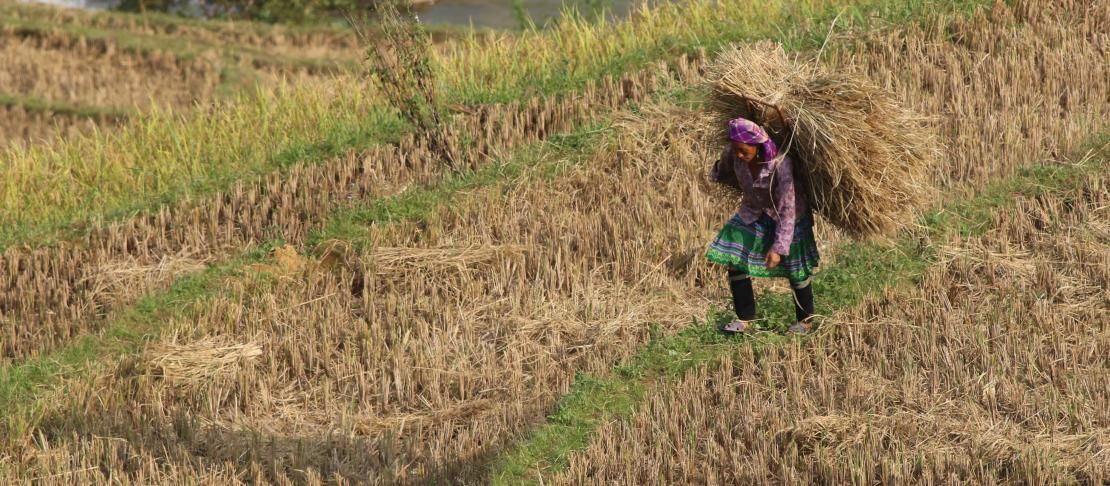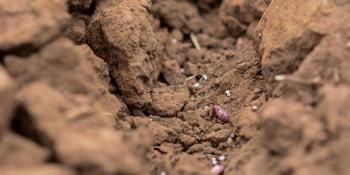Working towards sustainable rice straw management in Vietnam

In a recent workshop, stakeholders discussed strategic actions for scaling sustainable rice straw management in Vietnam.
To discuss the best practices and policy recommendations on sustainable rice straw management in Vietnam, a workshop was organized by the International Rice Research Institute (IRRI), together with Ministry of Agriculture and Rural Development (MARD) of Vietnam and the Vietnam Academy of Agricultural Sciences (VAAS), in Hanoi on 5 June 2018. Part of the three-year BMZ-IRRI Straw Management Project, the workshop aimed to present the project’s research outputs on effective rice straw management technologies and practices for improved livelihoods, sustainability, and low environmental footprint in rice-based production systems.
The workshop provided an excellent avenue for IRRI and partners to celebrate the International World Environment Day. Decision-makers from relevant national and provincial government agencies, local and international researchers, members of academia, representatives of farmers’ groups and cooperatives, and other stakeholders identified strategies for scaling of sustainable rice straw management to address related environmental and human health impacts as well as provide additional economic benefits for Vietnamese farmers. The workshop was supported by the CGIAR Research Programs on Climate Change, Agriculture and Food Security (CCAFS) and on Rice, which served as an opportunity for collaboration among CGIAR research programs (CRPs).
Based on the studies conducted under the project, Dr. Martin Gummert, director of the Straw Management Project, shared several best practices for rice straw management for scaling up and out in Vietnam. From science-based evidence, business models were developed for off-field straw management technologies, rice straw-based composting, mushroom cultivation, and rice straw-based cattle fodder.
Dr. Ole Sander, country representative of IRRI Vietnam, stressed the opportunity for sustainable straw management to contribute to the national climate change mitigation goals. With rice production having a larger contribution to GHG emissions than the transportation sector in Vietnam, reusing waste products from crop production such as rice straw can help Vietnam to fulfill its Nationally Determined Contributions in the agriculture sector.
With all the mitigation potentials and economic benefits, there are still challenges that hinder the mainstreaming of sustainable straw management. In an open forum, workshop participants reiterated that there is no one-size-fits-all approach: the technologies and practices should address the unique biophysical (e.g. farm size, changing weather) and socioeconomic (e.g. existing agriculture practices, market availability, government support and policies) characteristics of the different agro-ecological regions in Vietnam.
To address these concerns, the workshop participants identified the existing gaps and recommended actions concerning policy, research, and extension, which support sustainable rice straw management. Some recommendations include: conducting more location-specific research to test technological applicability, developing innovative products, and evaluating business models; implementing capacity building activities for the various stakeholders; strengthening national extension initiatives to support scaling out; reviewing and improving related national and local government policies; and mobilizing resources from the government, and private and international development sectors.
Also part of the workshop was the handover of the Vietnamese Climate-Smart Agriculture (CSA) book to the National Extension Center, members of academia, and representatives of the different provincial Departments of Agriculture and Rural Development. Published by CCAFS Southeast Asia, the book features various CSA practices for straw management, such as biomass recycling and agricultural residue treatment.
Continue reading the story on the IRRI News Bulletin: Stakeholders learn about sustainable rice straw management in Vietnam
Read more:
- Blog: Climate experts identify building blocks of Vietnam’s mitigation actions in rice
- News update: A menu for climate-smart agriculture outscaling in Vietnam
- In the News: Sustainable rice straw management in Vietnam I VNews and more
This is an excerpt of the original news story, Stakeholders learn about sustainable rice straw management in Vietnam, first published on the International Rice Research Institute (IRRI) News Bulletin.
Eisen Bernardo is the Senior Communication Specialist of CCAFS Southeast Asia.



